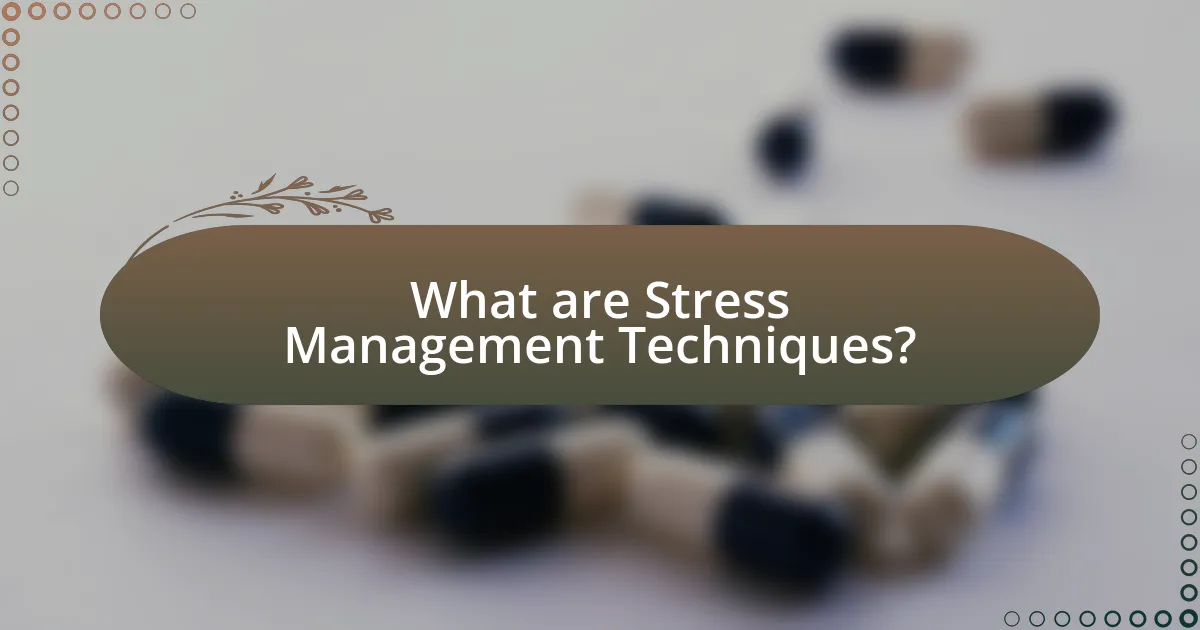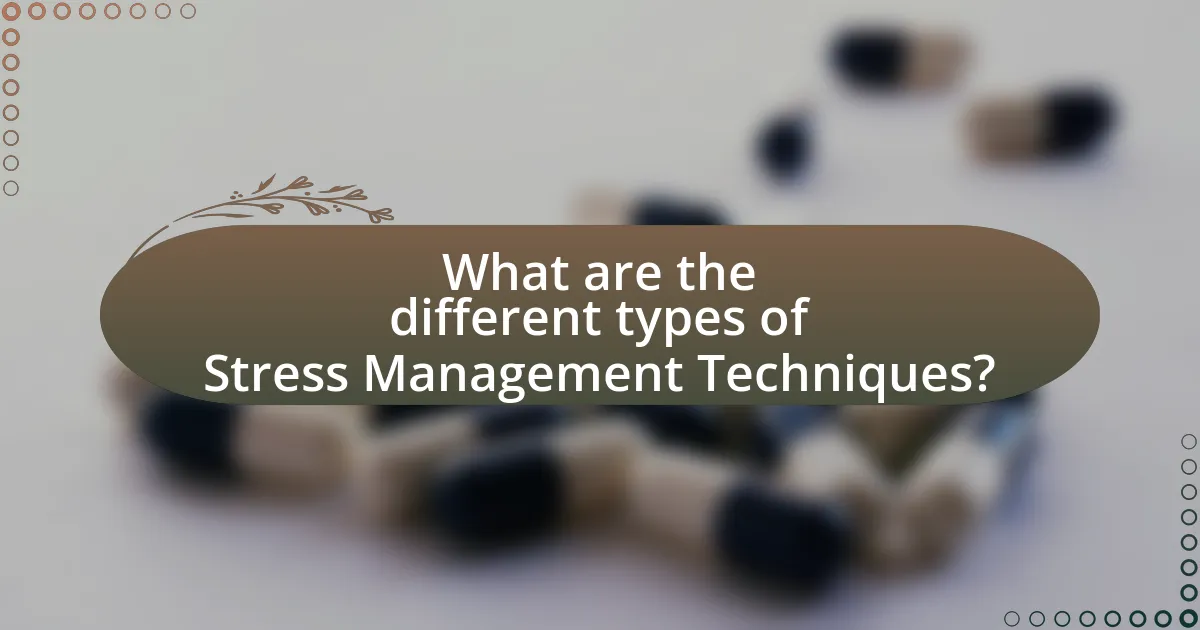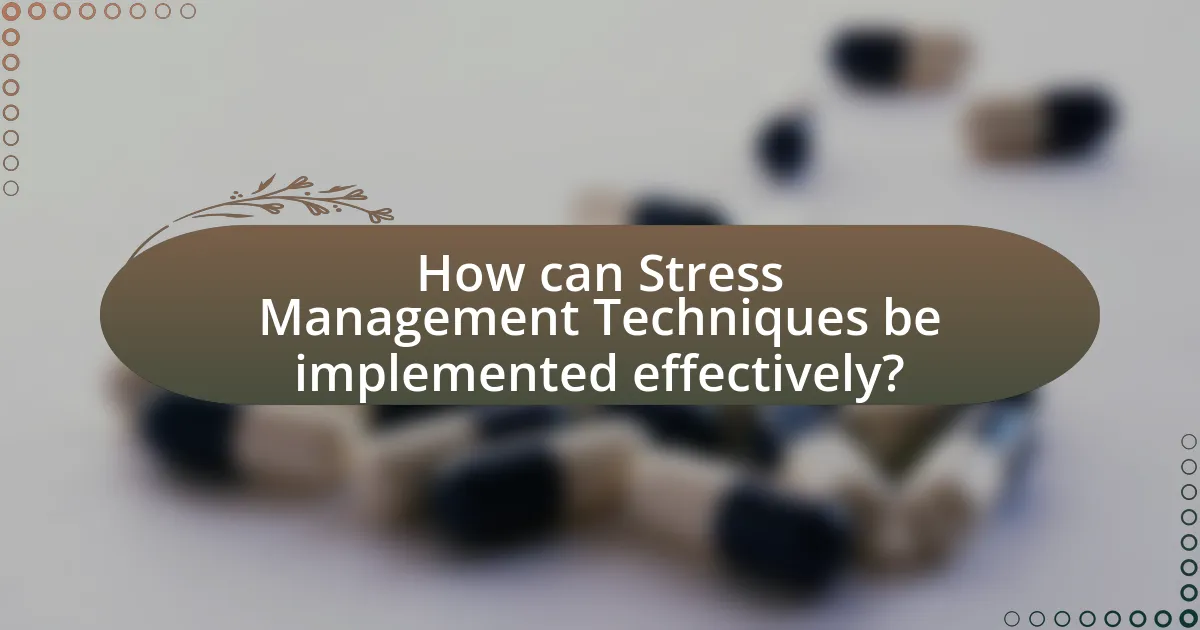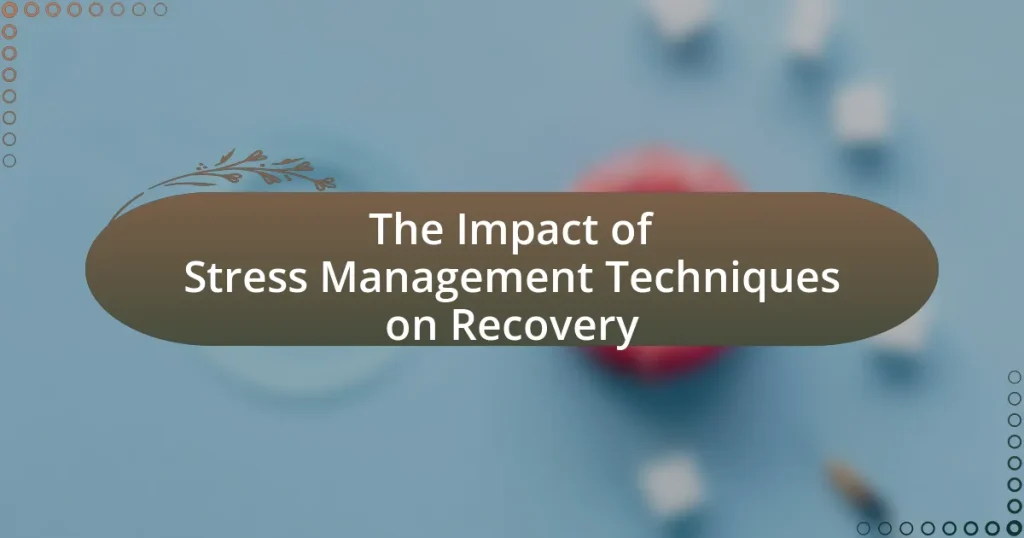The article focuses on the impact of stress management techniques on recovery, highlighting various strategies such as mindfulness meditation, deep breathing exercises, physical activity, and cognitive-behavioral therapy. It discusses how these techniques can lower stress levels, enhance emotional regulation, and improve recovery outcomes by reducing cortisol levels and promoting faster healing. Additionally, the article examines the effectiveness of these techniques across different individuals, the physiological and psychological effects of stress on recovery, and practical tips for integrating stress management into recovery plans. It emphasizes the importance of personalized approaches and professional guidance in optimizing stress management practices for improved health and well-being.

What are Stress Management Techniques?
Stress management techniques are strategies designed to help individuals cope with stress and reduce its negative effects on mental and physical health. Common techniques include mindfulness meditation, deep breathing exercises, physical activity, time management, and cognitive restructuring. Research indicates that these techniques can significantly lower stress levels; for instance, a study published in the Journal of Health Psychology found that mindfulness meditation can reduce stress by enhancing emotional regulation and decreasing anxiety.
How do Stress Management Techniques influence recovery?
Stress management techniques significantly enhance recovery by reducing physiological and psychological stress responses. These techniques, such as mindfulness, deep breathing, and cognitive-behavioral strategies, lower cortisol levels, which are linked to stress. Research indicates that lower cortisol levels can improve immune function and accelerate healing processes. For instance, a study published in the Journal of Psychosomatic Research found that individuals who practiced stress management techniques experienced faster recovery from surgery compared to those who did not engage in such practices. This evidence underscores the critical role that effective stress management plays in facilitating recovery.
What specific techniques are most effective for recovery?
Mindfulness meditation and cognitive-behavioral therapy (CBT) are among the most effective techniques for recovery from stress. Mindfulness meditation enhances emotional regulation and reduces anxiety, as evidenced by a meta-analysis published in JAMA Internal Medicine, which found that mindfulness practices significantly improve psychological well-being. Cognitive-behavioral therapy, on the other hand, has been shown to effectively address negative thought patterns and behaviors, leading to improved recovery outcomes, as supported by numerous studies, including one published in the journal Psychological Bulletin, which highlights its efficacy in treating anxiety and depression.
How do these techniques vary in effectiveness across different individuals?
The effectiveness of stress management techniques varies significantly across individuals due to factors such as personality traits, coping styles, and personal circumstances. Research indicates that individuals with high levels of resilience tend to benefit more from techniques like mindfulness and cognitive-behavioral strategies, while those with lower resilience may find techniques such as physical exercise or social support more effective. A study published in the Journal of Health Psychology by McEwen and Stellar (1993) highlights that individual differences in stress response can influence how well a person responds to various stress management techniques, demonstrating that tailored approaches are often necessary for optimal recovery outcomes.
Why is stress management important for recovery?
Stress management is crucial for recovery because it directly influences physical and mental health outcomes. Effective stress management techniques, such as mindfulness and relaxation exercises, can lower cortisol levels, which, when elevated, can impede healing and exacerbate health issues. Research indicates that individuals who engage in stress management during recovery experience faster healing times and improved overall well-being, as evidenced by a study published in the Journal of Psychosomatic Research, which found that patients utilizing stress reduction techniques reported significantly lower pain levels and enhanced recovery rates.
What physiological effects does stress have on recovery processes?
Stress negatively impacts recovery processes by elevating cortisol levels, which can hinder tissue repair and immune function. Elevated cortisol, a stress hormone, can lead to increased inflammation and reduced protein synthesis, both of which are critical for recovery after injury or intense physical activity. Research indicates that chronic stress can impair the body’s ability to heal, as seen in studies showing that individuals with high stress levels experience slower recovery times from injuries and illnesses. For instance, a study published in the Journal of Neuroimmunology found that stress-induced cortisol release can suppress the immune response, delaying recovery.
How does stress impact mental health during recovery?
Stress negatively impacts mental health during recovery by exacerbating symptoms of anxiety and depression. High levels of stress can lead to increased cortisol production, which is linked to impaired cognitive function and emotional regulation. Research indicates that individuals experiencing chronic stress during recovery are more likely to face setbacks, as stress can hinder motivation and the ability to engage in healthy coping strategies. A study published in the Journal of Clinical Psychology found that stress management techniques significantly improved recovery outcomes by reducing anxiety and enhancing overall well-being.

What are the different types of Stress Management Techniques?
The different types of stress management techniques include cognitive-behavioral therapy, mindfulness meditation, physical exercise, deep breathing exercises, and time management strategies. Cognitive-behavioral therapy helps individuals identify and change negative thought patterns, which can reduce stress levels. Mindfulness meditation promotes relaxation and awareness, leading to decreased anxiety. Physical exercise releases endorphins, which are natural stress relievers. Deep breathing exercises activate the body’s relaxation response, lowering heart rate and blood pressure. Time management strategies help individuals prioritize tasks, reducing feelings of overwhelm. Each of these techniques has been shown to effectively mitigate stress and improve overall well-being.
How do mindfulness and meditation contribute to recovery?
Mindfulness and meditation significantly contribute to recovery by enhancing emotional regulation and reducing stress. These practices promote a state of relaxation, which can lower cortisol levels, a hormone associated with stress. Research indicates that individuals who engage in mindfulness and meditation experience improved mental health outcomes, including reduced anxiety and depression, which are critical for recovery processes. A study published in the journal “Psychosomatic Medicine” found that mindfulness-based interventions can lead to substantial improvements in psychological well-being, thereby facilitating recovery from various health conditions.
What are the key practices within mindfulness that aid recovery?
Key practices within mindfulness that aid recovery include meditation, deep breathing exercises, and body scanning. Meditation helps individuals focus their attention and eliminate distractions, which can reduce stress and promote emotional well-being. Deep breathing exercises activate the body’s relaxation response, lowering heart rate and blood pressure, which is beneficial for recovery. Body scanning encourages awareness of physical sensations, allowing individuals to identify areas of tension and promote relaxation. Research indicates that these mindfulness practices can significantly enhance recovery outcomes by reducing anxiety and improving overall mental health.
How does meditation specifically affect stress levels during recovery?
Meditation significantly reduces stress levels during recovery by promoting relaxation and enhancing emotional regulation. Research indicates that mindfulness meditation can lower cortisol levels, a hormone associated with stress, thereby facilitating a more effective recovery process. A study published in the journal “Psychosomatic Medicine” found that participants who engaged in mindfulness meditation experienced a 30% reduction in perceived stress and improved coping mechanisms compared to those who did not meditate. This evidence supports the conclusion that meditation serves as a valuable tool in managing stress during recovery.
What role does physical activity play in stress management for recovery?
Physical activity plays a crucial role in stress management for recovery by reducing stress hormones and promoting the release of endorphins, which enhance mood and overall well-being. Engaging in regular exercise has been shown to lower cortisol levels, a primary stress hormone, thereby alleviating feelings of anxiety and tension. Research published in the Journal of Clinical Psychiatry indicates that individuals who participate in physical activity experience a significant reduction in stress and improved recovery outcomes. This evidence supports the effectiveness of exercise as a vital component in managing stress and facilitating recovery.
What types of physical activities are most beneficial for stress relief?
Aerobic exercises, such as running, swimming, and cycling, are most beneficial for stress relief. These activities increase the production of endorphins, which are natural mood lifters, and help reduce levels of stress hormones like cortisol. Research published in the Journal of Clinical Psychiatry indicates that regular aerobic exercise can significantly decrease anxiety and depression symptoms, enhancing overall mental well-being. Additionally, yoga and tai chi, which combine physical movement with mindfulness, have been shown to lower stress levels by promoting relaxation and improving emotional regulation.
How does exercise impact the recovery timeline?
Exercise significantly accelerates the recovery timeline by enhancing blood circulation, which facilitates the delivery of oxygen and nutrients to injured tissues. This increased blood flow promotes faster healing and reduces inflammation, leading to a more efficient recovery process. Research indicates that individuals who engage in regular physical activity experience improved recovery outcomes, as exercise stimulates the release of growth factors and hormones that aid tissue repair. For instance, a study published in the Journal of Rehabilitation Research and Development found that patients who participated in structured exercise programs post-injury had a 30% faster recovery rate compared to those who remained sedentary.

How can Stress Management Techniques be implemented effectively?
Stress management techniques can be implemented effectively by incorporating structured practices such as mindfulness, cognitive-behavioral strategies, and regular physical activity into daily routines. Mindfulness meditation, for instance, has been shown to reduce stress levels significantly; a study published in the Journal of Health Psychology found that participants practicing mindfulness reported a 30% reduction in perceived stress. Cognitive-behavioral strategies, which involve identifying and changing negative thought patterns, can also enhance emotional resilience, as evidenced by research in the American Journal of Psychiatry that indicates these techniques can lead to a 50% decrease in anxiety symptoms. Additionally, engaging in regular physical activity, supported by findings from the American Psychological Association, can lower stress hormones and improve mood, making it a vital component of effective stress management.
What are the best practices for integrating stress management into recovery plans?
The best practices for integrating stress management into recovery plans include incorporating mindfulness techniques, establishing a regular exercise routine, and promoting social support systems. Mindfulness techniques, such as meditation and deep-breathing exercises, have been shown to reduce stress and improve emotional regulation, which is crucial for recovery. Regular physical activity not only enhances physical health but also releases endorphins, which can alleviate stress and improve mood. Additionally, fostering social support through group therapy or community involvement can provide emotional resources and reduce feelings of isolation, further aiding the recovery process. Research indicates that these practices significantly enhance overall recovery outcomes by addressing both psychological and physical aspects of stress management.
How can individuals personalize stress management techniques for their needs?
Individuals can personalize stress management techniques by assessing their unique stress triggers, preferences, and coping styles. This involves identifying specific stressors, such as work-related pressures or personal relationships, and determining which techniques, like mindfulness, exercise, or time management, resonate most effectively with them. Research indicates that tailored approaches, such as those outlined in the Journal of Clinical Psychology, show improved outcomes in stress reduction when individuals engage in methods that align with their personal values and lifestyles. By experimenting with various strategies and reflecting on their effectiveness, individuals can create a customized stress management plan that enhances their overall recovery and well-being.
What common challenges do people face when implementing these techniques?
People commonly face several challenges when implementing stress management techniques, including lack of time, difficulty in maintaining consistency, and skepticism about effectiveness. Lack of time often arises from busy schedules, making it hard for individuals to prioritize stress management practices. Difficulty in maintaining consistency can stem from the need for regular practice to see benefits, which many find challenging to integrate into their daily routines. Additionally, skepticism about the effectiveness of these techniques can hinder commitment, as individuals may doubt their ability to produce tangible results. Research indicates that these barriers can significantly impact the successful adoption of stress management strategies, ultimately affecting recovery outcomes.
What resources are available for learning about Stress Management Techniques?
Resources available for learning about stress management techniques include books, online courses, workshops, and mobile applications. Books such as “The Relaxation and Stress Reduction Workbook” by Martha Davis provide practical exercises and insights into stress management. Online platforms like Coursera and Udemy offer courses specifically focused on stress management strategies, often taught by experts in psychology and wellness. Workshops conducted by mental health professionals can provide hands-on experience and personalized guidance. Additionally, mobile applications like Headspace and Calm offer guided meditations and stress relief exercises, making techniques accessible anytime. These resources collectively support individuals in effectively managing stress and enhancing recovery.
How can professional guidance enhance the effectiveness of stress management?
Professional guidance enhances the effectiveness of stress management by providing tailored strategies and expert insights that address individual needs. Trained professionals, such as psychologists or counselors, can assess a person’s unique stressors and coping mechanisms, allowing for personalized interventions that are more likely to yield positive outcomes. Research indicates that individuals who engage in therapy or counseling report a 30% greater reduction in stress levels compared to those who rely solely on self-help methods. This effectiveness is attributed to the structured support and accountability that professionals offer, which can lead to improved emotional regulation and resilience in managing stress.
What online tools and apps support stress management practices?
Online tools and apps that support stress management practices include Headspace, Calm, and Insight Timer. Headspace offers guided meditation and mindfulness exercises, which have been shown to reduce stress levels and improve emotional well-being. Calm provides relaxation techniques, sleep stories, and breathing exercises, contributing to lower anxiety and better sleep quality. Insight Timer features a vast library of free meditations and talks from various experts, promoting mindfulness and stress reduction. Research indicates that regular use of these apps can lead to significant improvements in stress management and overall mental health.
What practical tips can enhance the effectiveness of Stress Management Techniques in recovery?
Practical tips to enhance the effectiveness of stress management techniques in recovery include establishing a consistent routine, incorporating mindfulness practices, and engaging in physical activity. A consistent routine helps create a sense of stability, which can reduce anxiety and improve focus during recovery. Mindfulness practices, such as meditation or deep-breathing exercises, have been shown to lower stress levels and enhance emotional regulation, as evidenced by a study published in the Journal of Clinical Psychology, which found that mindfulness-based interventions significantly reduce stress and improve overall well-being. Additionally, regular physical activity releases endorphins, which are natural stress relievers, and has been linked to improved mood and cognitive function, according to research from the American Psychological Association.
